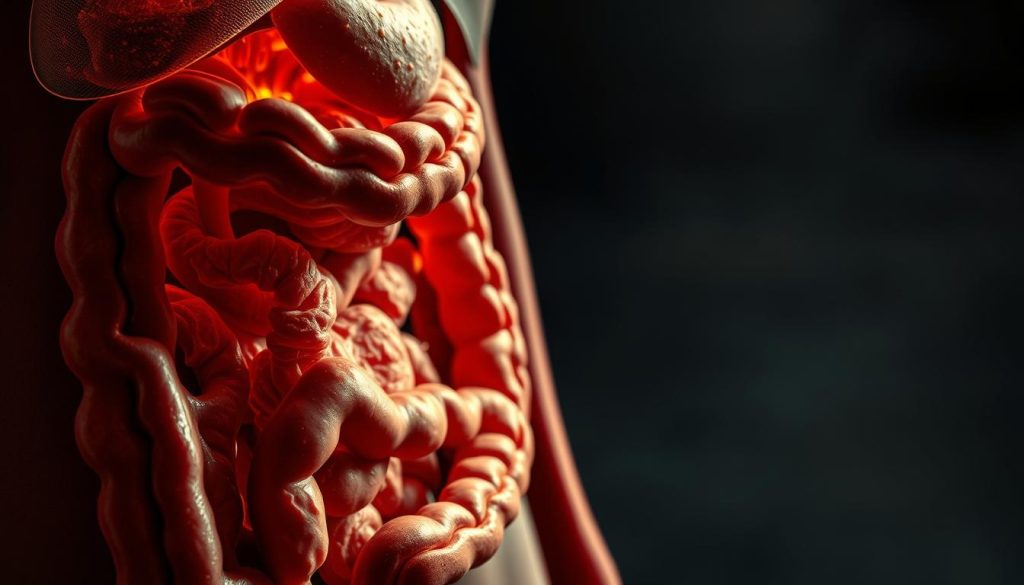Your body has an amazing internal clock that does more than just control sleep. It also tells your stomach when to make acid and when to release enzymes. This clock helps you digest food efficiently.
For millions of years, humans ate during the day and fasted at night. Our digestive system is set up to follow this pattern. It works best when it’s light out and slows down when it’s dark.
But modern life often messes with this natural rhythm. Eating late, irregular meal times, and working shifts can upset your body’s clock. When your eating schedule doesn’t match your body’s rhythm, you might feel tired, have poor digestion, and feel moody. Knowing about this connection can help you improve your health by eating at the right times.
Understanding Circadian Rhythms and Their Importance
Your body has a built-in timing system. It controls when you feel awake, hungry, or tired. This system works all day to keep you at your best. Knowing how it works can help you choose better times to eat, sleep, and exercise.
Your circadian rhythms affect your health in many ways. They influence your energy, mood, and digestion. If these rhythms get out of sync, you might feel hungrier, sleep worse, and feel less well overall.
What Are Circadian Rhythms?
Circadian rhythms are natural cycles that happen about every 24 hours. The term “circadian” comes from Latin, meaning “about a day.” These rhythms are found in almost all living things, from tiny bacteria to humans.
Your biological clock is in a small part of your brain called the suprachiasmatic nucleus. This master clock works with smaller clocks in your body. Together, they help your body get ready for the day and night.

These internal timers evolved over millions of years. They help your body prepare for the day and night. For example, your body gets ready for sleep when it’s dark and for activity when it’s light.
How Circadian Rhythms Affect Your Body
Your biological clock controls many important body functions. Knowing how it works can help you live in sync with your body.
Here are the key ways circadian rhythms impact your body:
- Sleep-wake cycles: Your brain releases melatonin in the evening to make you sleepy and cortisol in the morning to help you wake up
- Body temperature: Your core temperature naturally drops at night and rises during the day
- Hormone production: Growth hormone, insulin, and digestive enzymes are released at specific times
- Metabolism: Your body processes food more efficiently at certain times of day
- Immune function: Your immune system is more active during certain hours to fight off infections
When your circadian rhythms are in sync, your body works smoothly. You feel alert during the day and tired at night. Your appetite and digestion work well too.
But, if these rhythms get disrupted, you might feel tired, have digestive problems, or have trouble concentrating. This is why shift workers and people with jet lag often struggle with health issues.
Key Factors Influencing Circadian Rhythms
Many factors can affect your biological clock. Knowing these can help you keep your rhythms strong and stable.
The most important factors that affect your circadian rhythms include:
- Light exposure: Bright light, especially blue light, signals your brain that it’s daytime and suppresses melatonin production
- Meal timing: When you eat sends powerful signals to your internal clocks, especially those in your digestive organs
- Physical activity: Exercise at different times can either strengthen or shift your circadian rhythms
- Social cues: Regular schedules and social interactions help reinforce your body’s natural timing
- Temperature changes: Exposure to cooler temperatures in the evening and warmer temperatures in the morning supports natural rhythms
Modern life often goes against our natural biological clock. Artificial lighting, irregular meal times, and constant screen exposure confuse your internal timing system. Night shift work, frequent travel across time zones, and staying up late on weekends can also disrupt your rhythms.
The good news is that your circadian rhythms can adapt. With consistent habits and the right environmental cues, you can reset and strengthen your biological clock. This leads to better sleep, improved digestion, and enhanced overall health.
The Science Behind Digestion and Circadian Rhythms
Inside our bodies, a special connection happens every day. Our internal clock and digestive system work together. This partnership has evolved over millions of years to improve how we digest food and absorb nutrients.
Our gut microbiome is key in this timing. These good bacteria help control digestion and respond to our body’s natural clock. This connection explains why eating at certain times feels more natural and effective.
The Digestive Process Explained
Digestion starts when food goes into your mouth and continues through many steps. Your body breaks down food using mechanical and chemical processes. This journey involves multiple organs, each with its own timing.
The digestive process includes these main stages:
- Mouth: Saliva production and initial breakdown
- Stomach: Acid production and protein digestion
- Small intestine: Nutrient absorption and enzyme activity
- Large intestine: Water absorption and gut microbiome activity
- Elimination: Waste removal and toxin clearance
Each stage has its own schedule. Your stomach makes more acid at certain times of the day. Your gut microbiome is more active at specific times. These patterns are not random but are carefully set by your circadian clock.
Impact of Circadian Rhythms on Digestion
Your circadian rhythms affect how well your digestive system works. Morning hours have more stomach acid and faster metabolism. Evening hours have slower digestion and less enzyme activity.
The gut microbiome also follows these rhythms. Good bacteria are more active during the day when you’re likely to eat. They slow down at night when your body repairs itself.
Key digestive functions that follow circadian patterns include:
- Stomach acid production peaks in the morning
- Digestive enzyme release increases during daylight hours
- Gut motility speeds up in the early evening
- Nutrient absorption efficiency varies throughout the day
Eating a big meal late at night can cause discomfort. Your digestive system isn’t ready for heavy food processing then. Going against these patterns can strain your digestive organs and lower nutrient absorption.
Hormonal Regulation and Timing
Hormones are messengers between your circadian clock and digestive system. They coordinate timing for optimal digestion and metabolism. The most important digestive hormones follow predictable daily patterns.
Ghrelin, the hunger hormone, rises before meals and drops after. Leptin, the satiety hormone, increases after meals to signal fullness. Both hormones work with your circadian clock to regulate appetite timing.
Other hormones that influence digestion include:
- Insulin: Regulates blood sugar and nutrient storage
- Cortisol: Affects metabolism and stress response
- Melatonin: Influences gut microbiome activity
- Growth hormone: Supports tissue repair and metabolism
These hormones don’t work alone. They form a complex network that responds to light, meal timing, and sleep. When this hormonal orchestra works with your circadian rhythms, digestion is more efficient and comfortable.
Disrupting these natural hormone patterns can cause digestive problems. Irregular eating confuses hormonal signals. This confusion can lead to poor appetite control and reduced digestive efficiency. Understanding these connections helps explain why regular meal timing supports better digestive health.
Eating Patterns and Circadian Rhythms
Aligning your eating schedule with your circadian rhythms is key for better metabolism and digestion. The field of chrononutrition shows that when you eat is as important as what you eat. Your body’s internal clock affects hormone production and enzyme activity, making meal timing crucial for health.
Our digestive system works in predictable cycles throughout the day. These cycles affect how we process nutrients and maintain energy levels. Understanding these rhythms helps you eat in sync with your body.
Ideal Times for Eating
Your body’s natural rhythms make certain times better for digestion. Morning is best for complex carbs and protein, thanks to peak insulin sensitivity. This supports stable blood sugar all day.
Lunch should be between 12 PM and 2 PM when digestion is strong. Your metabolism peaks then, making it ideal for larger meals. This aligns with eating patterns in many cultures.

Evening meals should be before 7 PM. Eating late can hurt sleep quality and recovery. Your digestive system slows down at night, making light dinners better for health.
Here are the best eating times:
- Breakfast: 6 AM to 9 AM for maximum metabolic benefit
- Lunch: 12 PM to 2 PM during peak digestive strength
- Dinner: 5 PM to 7 PM to support evening wind-down
- Snacks: Mid-morning and mid-afternoon if needed
Intermittent Fasting and Its Benefits
Intermittent fasting aligns with your circadian rhythms if done right. The 16:8 method, eating in an 8-hour window, fits natural hunger patterns. It gives your digestive system rest periods between meals.
Time-restricted eating supports cellular repair during fasting periods. Your body uses these breaks for maintenance and recovery. Many find intermittent fasting more natural and sustainable with chrononutrition principles.
Popular fasting methods include:
- 16:8 method with eating from 10 AM to 6 PM
- 14:10 approach for beginners starting gradually
- 5:2 method with reduced calories two days per week
- Alternate day fasting for more experienced practitioners
Always talk to healthcare providers before starting fasting. Needs vary, and some may need modified approaches due to health conditions or medications.
How Meal Timing Affects Digestion
Your digestive system follows daily patterns that affect nutrient absorption and metabolism. Eating big meals late at night can disrupt rest and repair. This mismatch can cause poor sleep and digestive issues.
Morning meal timing supports protein synthesis and muscle recovery. Your body produces more digestive enzymes during the day, improving nutrient absorption. This is why many feel more energetic after eating earlier.
Late-night eating disrupts several important processes:
- Interferes with growth hormone production during sleep
- Reduces insulin sensitivity over time
- Disrupts natural detoxification processes
- Can contribute to acid reflux and heartburn
- May impact weight management efforts
Consistent meal timing regulates your internal clock and improves digestion. Your body learns to anticipate meals and prepares digestive enzymes. This leads to better nutrient absorption and fewer digestive issues over time.
Disruptions in Circadian Rhythms and Digestive Health
Understanding what disrupts our body’s natural timing is key. It helps us see why our digestive system might feel off. When our circadian rhythms get out of sync, it affects our whole digestive process.
This can really hurt our metabolic health and overall well-being. But, the good news is that we can fix this. Our bodies are very resilient and can heal if we give them the right conditions.
Common Causes of Circadian Disruption
Many things in our modern lives can mess with our internal clocks. Shift work is a big one, making our bodies stay awake when they want to sleep.
Jet lag also messes with our timing, changing our time zones too fast. Eating late at night confuses our digestive system, which likes to wind down in the evening.
Too much screen time before bed can also mess with our sleep. Irregular sleep, even on weekends, can reset our internal clocks and affect our health.
- Shift work and rotating schedules
- Frequent travel across time zones
- Late-night meals and snacking
- Blue light exposure from devices
- Inconsistent sleep and wake times
Symptoms of Digestive Disturbances
When our circadian rhythms are off, our digestive system sends warning signs. Bloating and gas often go up, especially after meals that should digest easily.
Irregular bowel movements become more common, with some people getting constipation and others loose stools. Feeling tired all day is a sign that our metabolic health is struggling.

It’s harder to manage weight when our hunger hormones get mixed up. Many people crave sugary or high-carb foods, especially at night.
Poor sleep quality can make digestion problems worse, creating a cycle. Heartburn and acid reflux can get worse, especially when eating close to bedtime.
Long-term Consequences of Mismatched Rhythms
Chronic circadian disruption can lead to serious health problems. The risk of type 2 diabetes goes up when our metabolic health is out of balance.
Obesity becomes more likely as disrupted sleep affects our hunger and fullness hormones. Our bodies struggle to process glucose when our eating patterns don’t match our natural rhythms.
Cardiovascular disease risk goes up due to increased inflammation and metabolic stress. Our immune system weakens, making us more prone to infections and slower to heal.
But, these consequences aren’t set in stone. By paying attention to our circadian rhythms, we can restore healthy digestion and improve our metabolic health. The key is to recognize these patterns early and take steps to realign our natural rhythms.
Strategies to Synchronize Your Eating Schedule
Aligning your eating with your body’s clock is possible with the right strategies. These methods improve digestion and sleep. Small, steady changes can greatly improve how your body handles food and energy.
Tips for Aligning Meals with Your Circadian Rhythm
Start by setting regular meal times that match your natural energy peaks. Eat your biggest meal at midday when your body’s digestive enzymes are most active. This helps with better nutrient absorption and avoids digestive issues at night.
Stick to a 10-12 hour eating window during the day. Have breakfast within two hours of waking to signal the start of the day. Finish your last meal at least three hours before bedtime for better digestion during sleep.
If you need to change your eating schedule, do it slowly. Move your meal times by 15-30 minutes each day. This gentle change helps your body adjust without shock. Keep a food timing journal to see how meal times affect your energy and digestion.

Incorporating Light and Sleep Hygiene
Exposure to morning light within the first hour of waking helps reset your body’s clock. Spend 10-15 minutes outside or near a bright window while having breakfast. This natural light helps your body’s internal timing system.
Dim artificial lights two hours before bedtime to prepare your body for rest. Blue light from screens can disrupt sleep and digestion. Use warm lighting in the evening to help your body produce melatonin.
Ensure you get 7-9 hours of quality sleep each night. Poor sleep affects hunger hormones and digestion the next day. Stick to the same bedtime and wake time, even on weekends, to strengthen your circadian rhythm.
Mindfulness in Eating Habits
Eat without distractions to better understand your hunger and fullness signals. Turn off screens and focus on your food’s taste, texture, and satisfaction. This awareness helps you eat in sync with your natural appetite.
Pay attention to your body’s energy levels to find the best eating times. Notice when you’re naturally hungry versus eating out of habit. This self-awareness helps align meals with your circadian patterns.
Take a brief pause before meals to check your hunger level. Ask yourself if you’re eating because you’re hungry or due to external cues. This mindful approach supports healthy digestion and circadian alignment.
Remember, adjusting your eating schedule takes time and patience. It can take weeks for your body to fully adapt to new patterns. Celebrate small victories and stay consistent for the best results.
The Role of Lifestyle Factors
Three lifestyle factors can greatly affect your body’s internal clock and digestion. These are exercise, stress management, and sleep quality. They work together to either help or harm your digestive health. Knowing how to improve these areas can lead to better wellness.
When these lifestyle elements are in sync, they support healthy digestion. But neglecting them can mess with your body’s natural rhythms and cause digestive problems.
Exercise and Its Timing
When and how you exercise is key to your circadian rhythms and digestion. Morning workouts from 6 AM to 10 AM can reset your internal clock and boost digestion. This also helps control cortisol levels, which are highest in the morning.
Moderate exercise in the morning improves blood flow to your digestive organs and helps your gut move food well. Walking, jogging, or yoga are great choices for this time.
Exercising late at night, especially after 8 PM, can mess with your sleep prep. This messes with your circadian rhythms and digestion. If you must exercise at night, try gentle activities like stretching or light walking.
Stress Management for Better Digestion
Chronic stress harms your circadian rhythms and digestion by keeping cortisol high. High cortisol disrupts your natural rhythm and hurts digestion. It slows digestion, reduces nutrient absorption, and increases gut inflammation.
Good stress management can balance your system. Deep breathing, meditation, and muscle relaxation can lower cortisol and aid digestion. Even a few minutes of deep breathing before meals can help.
Managing your time well also reduces stress. Having structured routines, setting achievable goals, and saying no to too much can keep cortisol low.
The Importance of Sleep Quality
Good sleep is crucial for healthy circadian rhythms and digestion. Sleep repairs digestive tissues, balances hormones, and resets your internal clock. Poor sleep messes with these processes and can cause digestive issues.
Consistent sleep and wake times strengthen your circadian rhythms. Going to bed and waking up at the same time every day, even on weekends, helps. This consistency regulates cortisol and improves digestion.
A good sleep environment also boosts sleep quality and digestion. Keep your bedroom cool, dark, and quiet. Avoid screens for at least an hour before bed, as blue light can mess with your rhythms and sleep.
Future Research and Implications for Health
Scientists are finding out how our internal clocks impact our health. They’re discovering new ways to eat and live that match our natural rhythms.
Emerging Studies on Circadian Rhythms
New studies link timing to health benefits. They’re looking into how melatonin affects our gut and digestion. This could lead to nutrition plans tailored to our unique rhythms.
They’re also studying how food affects our internal clocks. This research might help create meal plans for better health.
Potential Treatments and Recommendations
Future treatments could include melatonin therapy to fix disrupted rhythms. Doctors might suggest eating schedules along with medicines. Light therapy and timed meals could help with digestive issues.
Personalized medicine might soon use your circadian rhythm in treatment plans. This could make treatments more effective for everyone.
The Overall Impact on Well-being
Eating in sync with your body can change your health. It can improve digestion, energy, mood, and sleep. These changes support long-term wellness.
Listening to your body’s natural timing is a simple way to better health. Small changes in eating times can greatly improve how you feel.

